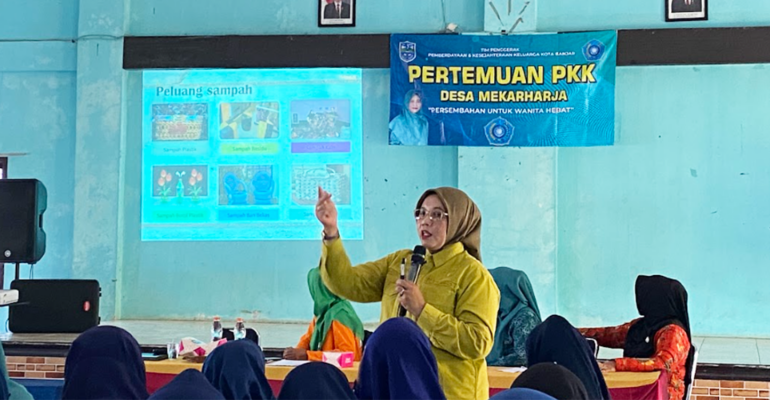IPB University Innovation KKNT Students Assist Mekarharja Residents in Waste Bank Management and Eco-Enzyme Production

IPB University Thematic Real Work Lecture (KKNT) Innovation students organized a workshop on waste bank management and eco-enzyme production at the Gor Village Mekarharja, Purwaharja District, Banjar City, West Java.
The event featured expert speakers Eris Resmiar, Director of Harapan Waste Bank, and Yani Hendaryani, SP, Senior Staff for Community and Village Empowerment.
According to Fasha, Coordinator of KKNT Innovation in Mekarharja Village, the event aims to promote environmentally friendly practices and sustainable resource management.
“This program not only teaches how to make eco-enzymes as substitutes for chemical substances but also educates the community on the importance of reducing waste and reusing existing resources,” he said.
“With this assistance, we hope that the residents of Mekarharja Village will become more environmentally conscious and capable of managing waste more effectively, thereby improving their quality of life,” added Fasha.
Yani Hendaryani delivered material on waste management using the waste bank system. “Waste is material discarded from human activities or natural processes that have no economic value. Mixed waste can cause diseases and natural disasters such as floods,” she said.
She added that good waste management could provide many economic opportunities, such as compost production, maggot cultivation, and eco-enzyme production. Yani also explained that a waste bank is a place for sorting and collecting recyclable or reusable waste with economic value.
“The waste bank aims to raise awareness among the community about maintaining a healthy, neat, and clean environment and increasing the economic value of waste as a raw material for various crafts and organic fertilizers,” she said.
Meanwhile, Eris Resmiar explained the process of making eco-enzymes, a versatile solution derived from fermenting organic waste. “The process of making eco-enzymes involves mixing water, fruit or vegetables, and molasses or sugar in specific ratios. Fermentation takes place for 21 days, and the resulting product can be used as a natural cleaner, liquid fertilizer, and much more,” he explained. (Tantia/Lp) (IAAS/RUM)



